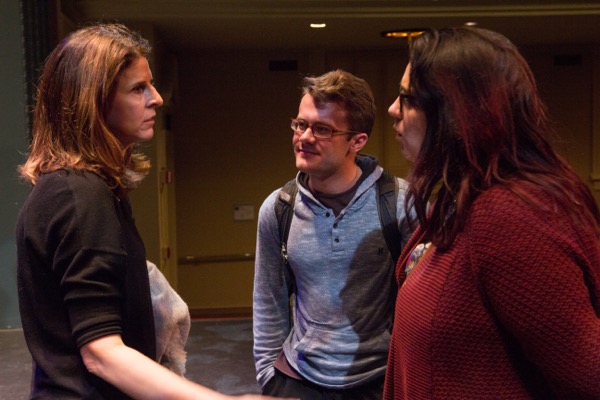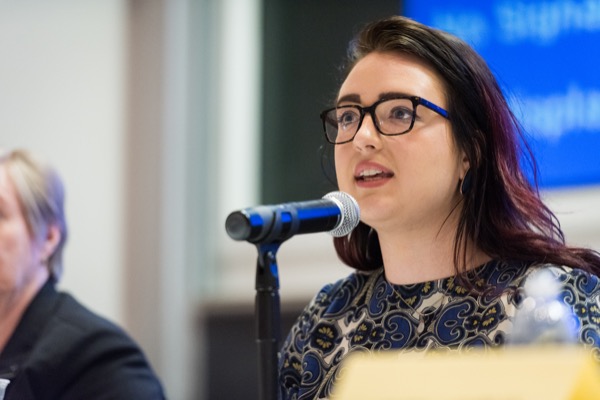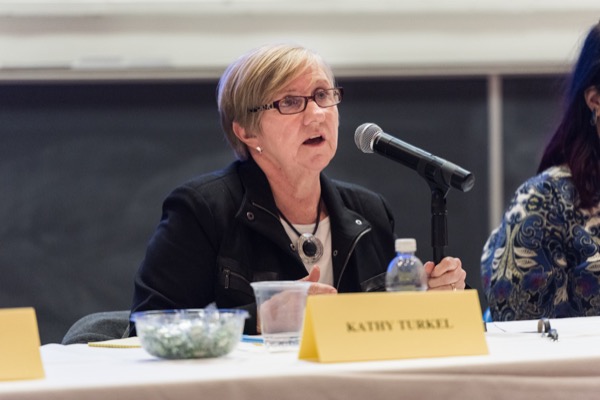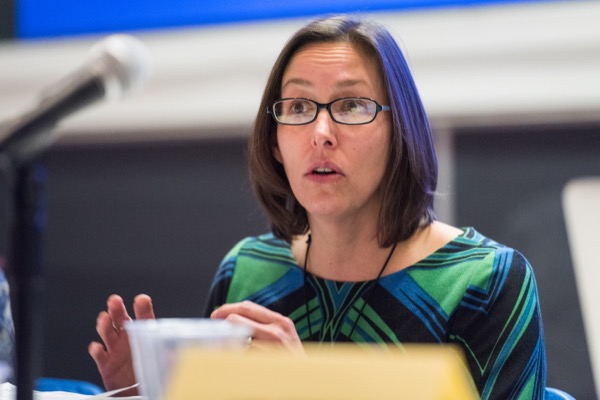

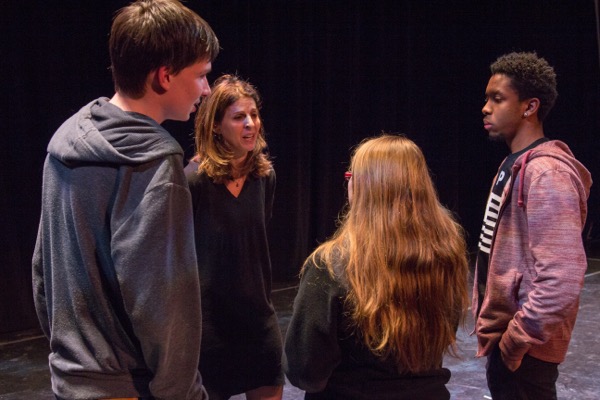
'Hunting Ground'
Producer discusses film on campus sexual assault at UD screening
3:55 p.m., March 12, 2015--The Hunting Ground, the new documentary by award-winning producer Amy Ziering, was the most difficult film she and director Kirby Dick have ever made, Ziering said after a preview at the University of Delaware on Wednesday, March 11.
Ziering, speaking after a standing ovation that followed the screening in Mitchell Hall, told the audience that she and Dick never planned to follow their acclaimed documentary The Invisible War, about sexual assault in the U.S. military, with one about the same problem on university campuses.
Campus Stories
From graduates, faculty
Doctoral hooding
But, she said, while visiting campuses to show The Invisible War, she heard from many students who had survived or were aware of sexual assaults at their institutions and approached her with requests that she make a film documenting that issue as well.
“We felt obliged to respond to the call,” she said.
The Hunting Ground, which premiered at the Sundance Film Festival in January and will air on CNN later this year, focuses on the high incidence of sexual assaults on college campuses and the neglect or mishandling of rape complaints by many schools. It includes personal accounts from numerous young women about their experiences, as well as interviews with psychologists and parents.
In a question-and-answer session after the screening at UD, Ziering described the difficulties in making the film, from interviewing victims who were willing to speak on camera and whose accounts could be documented, to locating a convicted perpetrator who agreed to be filmed from prison. She said she and Dick also struggled with how to tell the story in a compelling cinematic way, while still accurately explaining policy and legal details, and how to choose which universities to include.
“We tried to pick [cases from] a variety of schools and types of schools,” she said, explaining why Ivy League, religious, large public and small private institutions were all included. The goal, she said, was to show that the film wasn’t about a particular group of universities but about a systemic problem.
Audience members asked Ziering’s advice on how to get involved in finding solutions to the problem. She encouraged them to educate fellow students, faculty and administrators, to offer support to victims, and to advocate for legislative and policy changes.
Two young women featured prominently in the film filed a federal complaint against the University of North Carolina at Chapel Hill and have gone on to found the Title IX Network, a national coalition of students working to change the way universities handle sexual assault complaints. Ziering told the UD audience that the network can provide suggestions of ways to get involved.
In addition to The Invisible War, Ziering’s previous films include Outrage, The Memory Thief, Derrida and Taylor’s Campaign, a critically acclaimed documentary about Ron Taylor, a homeless person who ran for a seat on the Santa Monica City Council. Before becoming a filmmaker, she taught literature and film at Yale University and Bennington College.
The Hunting Ground screening at UD was sponsored by the College of Arts and Sciences’ Department of Philosophy, the Class of 1955 Ethics Endowment Fund, UD Student Wellness and Health Promotion and the University’s Sexual Assault Prevention and Education Committee.
Panelists discuss issues of sexual assault on campuses
Earlier in the day, Ziering was part of a panel discussion on the subject of sexual assaults on college campuses, held in Kirkbride Hall. Moderated by Richard Hanley, UD professor of philosophy, the panelists addressed the topic “Campus Sexual Assault: What Is the Problem and What Should We Do About It?”
Ziering described campuses as “target-rich environments for sexual predators” and said both law enforcement and university administrations need to take accusations of sexual assault seriously and take strong action against perpetrators. “If you don’t do anything to criminals, crime proliferates,” she said.
Angela Seguin, coordinator of UD’s Sexual Offense Support (SOS) at Student Wellness and Health Promotion, agreed, saying that “sexual assault is caused by sexual predators,” not by any action taken by victims. She said a small percentage of men commit the majority of such assaults, often choosing victims who seem vulnerable and isolated and pretending to befriend them.
“As institutions, we need to address [the issue] comprehensively,” Seguin said, adding that UD has taken numerous actions and continues to expand its educational outreach on the subject, its services for victims and training for faculty, staff and University police.
To student activist Sage Carson, “one of the big problems is that people think it isn’t a problem,” even when they know individuals who have been sexually assaulted. Conversations about the issue and about what constitutes healthy relationships should occur “on all campuses [and] in high schools and middle schools,” she said.
Panelist Kathleen Turkel, assistant professor of women and gender studies at UD, cited a 1979 article that raised the issue of sexual assault on campuses and argued that if women feared for their safety, their concerns were taking energy away from their studies and intellectual growth. That means, Turkel said, that women on such campuses aren’t getting an equal education, and so the issue is a problem not just for survivors “but for all of us.”
Amy Wax, who is Robert Mundheim Professor of Law at the University of Pennsylvania Law School, questioned some of the statistics that had been mentioned, saying that sexual assaults on campuses are not as prevalent as her fellow panelists indicated. The “current climate of moral panic” and concern for victims, she said, should not be allowed to erode the due-process rights and presumption of innocence for those accused of rape.
Wax also said cases should be handled by law enforcement, questioning why a university tribunal handling a student complaint would be trusted more than a jury in a criminal court.
Other panelists also acknowledged the need to respect due process, as well as the need for clear sexual-conduct policies on campuses, but said that the criminal justice system can work very slowly and that many complaints do not result in a conviction. University action is also important, they said, to protect victims and potential victims.
“The primary issue is prevention,” Turkel said. “There are practical steps we can take.”
Resources at UD
UD’s Sexual Offense Support (SOS) at Student Wellness and Health Promotion is a volunteer group that provides support and advocacy to survivors of sexual assault, intimate partner violence and stalking.
Support is available by phone 24 hours a day from trained SOS victim advocates. To contact SOS, call the Health Center at 831-2226 and ask for an SOS victim advocate. The staff will take a first name and phone number, and an advocate will call back within 10 minutes.
One-on-one appointments for support, crisis intervention and follow-up care are provided by the SOS coordinator. Call 831-3457 to make an appointment.
Article by Ann Manser
Photos by Tyler Jacobson and Evan Krape




